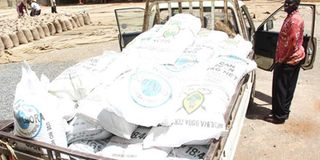Planned factory promises to end country’s fertiliser woes

A farmer prepares to leave with bags of fertiliser from the National Cereals and Produce Board's Eldoret depot on January 21, 2014. FILE PHOTO | JARED NYATAYA |
What you need to know:
- Lack of access to subsidised fertiliser has been blamed for the declining food production in the country
The perennial shortage of fertiliser in the country will soon be a thing of the past following a plan to put up a manufacturing plant in Nakuru County.
Lack of access to subsidised fertiliser has been blamed for the declining food production in the country.
The Principal Secretary in the ministry of Agriculture, Livestock and Fisheries, Sicily Kariuki, said feasibility studies by the private investor have been completed.
“In the not-so-distant future, the price of fertiliser will become affordable to all farmers as we will put up a manufacturing plant very soon,” said Ms Kariuki. She, however, did not give timelines.
“Our discussions with the private investor are nearing conclusion,” Ms Kariuki said.
The PS was speaking at the Great Rift Valley Lodge in Naivasha last week when she officially opened the All Africa Research Symposium organised by the Kenya Agricultural Research Institute (Kari) in collaboration with International Development Research Centre (IDRC) from Canada.
The theme of the five-day symposium was “Research to Feed Africa” and was attended by more than 120 researchers and scientists from nine African countries. The countries represented were Benin, Burkina Faso, Ethiopia, Mali, Niger, South Africa, Tanzania and hosts Kenya.
On the looming maize shortage in the country, the PS said the country is expected to have a shortfall of the staple food of between 15 and 20 per cent owing to depressed rains at the beginning of the year.
However, she said the country has enough food to last until August when harvest is due. Overall, cereal production is expected to decline by about eight per cent compared to last year.
“We expect to bridge the deficit through cross- border trade, especially with Tanzania, who have a surplus of maize,” the PS observed.





